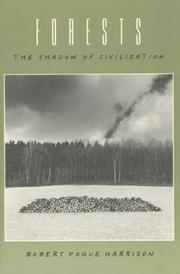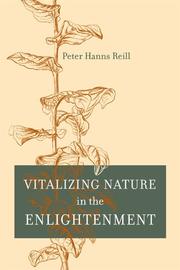| Listing 1 - 3 of 3 |
Sort by
|

ISBN: 1282646311 9786612646317 0226318052 9780226318059 9780226318066 0226318060 9781282646315 6612646314 0226318060 0226318079 9780226318073 Year: 1992 Publisher: Chicago : ©1992 University of Chicago Press,
Abstract | Keywords | Export | Availability | Bookmark
 Loading...
Loading...Choose an application
- Reference Manager
- EndNote
- RefWorks (Direct export to RefWorks)
In this wide-ranging exploration of the role of forests in Western thought, Robert Pogue Harrison enriches our understanding not only of the forest's place in the cultural imagination of the West, but also of the ecological dilemmas that now confront us so urgently. Consistently insightful and beautifully written, this work is especially compelling at a time when the forest, as a source of wonder, respect, and meaning, disappears daily from the earth. "Forests is one of the most remarkable essays on the human place in nature I have ever read, and belongs on the small shelf that includes Raymond Williams' masterpiece, The Country and the City. Elegantly conceived, beautifully written, and powerfully argued, [Forests] is a model of scholarship at its passionate best. No one who cares about cultural history, about the human place in nature, or about the future of our earthly home, should miss it.-William Cronon, Yale Review "Forests is, among other things, a work of scholarship, and one of immense value . . . one that we have needed. It can be read and reread, added to and commented on for some time to come."-John Haines, The New York Times Book Review
Forests in literature. --- Forests and forestry in literature --- Thematology --- biological sciences, trees, sociology, western thought, philosophy, cultural imagination, ecological dilemmas, insightful, beautifully written, environmentalism, environment, conservation, wildlife, mythology, essays, essay collection, history, culture, human place, literature, criticism, enlightenment, nostalgia, forestry, biology, botany, humanity, social issues, activism, geography, metaphysics, heidegger, relationship with nature.

ISBN: 0520928482 9780520928480 0520233204 9780520233201 Year: 2003 Publisher: Berkeley
Abstract | Keywords | Export | Availability | Bookmark
 Loading...
Loading...Choose an application
- Reference Manager
- EndNote
- RefWorks (Direct export to RefWorks)
Ecological restoration, the attempt to guide damaged ecosystems back to a previous, usually healthier or more natural, condition, is rapidly gaining recognition as one of the most promising approaches to conservation. In this book, William R. Jordan III, who coined the term "restoration ecology," and who is widely respected as an intellectual leader in the field, outlines a vision for a restoration-based environmentalism that has emerged from his work over twenty-five years. Drawing on a provocative range of thinkers, from anthropologists Victor Turner, Roy Rappaport, and Mary Douglas to literary critics Frederick Turner, Leo Marx, and R.W.B. Lewis, Jordan explores the promise of restoration, both as a way of reversing environmental damage and as a context for negotiating our relationship with nature. Exploring restoration not only as a technology but also as an experience and a performing art, Jordan claims that it is the indispensable key to conservation. At the same time, he argues, restoration is valuable because it provides a context for confronting the most troubling aspects of our relationship with nature. For this reason, it offers a way past the essentially sentimental idea of nature that environmental thinkers have taken for granted since the time of Emerson and Muir.
Restoration ecology. --- animal population. --- biological diversity. --- communion with nature. --- community. --- conservation. --- ecology. --- ecosystem. --- environment. --- environmentalism. --- flora and fauna. --- habitat. --- humans in nature. --- indigenous culture. --- indigenous people. --- invasive species. --- landscape. --- meditation. --- natural world. --- nature. --- nonfiction. --- plains. --- plants. --- prairies. --- reinhabitation. --- reintroduction. --- relationship with nature. --- relaxation. --- restoration ecology. --- restoration. --- science. --- spirituality. --- tidal marsh. --- vegetation. --- wetlands. --- wild animals. --- wilderness.

ISBN: 9786612357497 0520931009 1282357492 1598755471 9780520931008 0520241355 9780520241350 9781598755473 9781282357495 Year: 2005 Publisher: Berkeley : University of California Press,
Abstract | Keywords | Export | Availability | Bookmark
 Loading...
Loading...Choose an application
- Reference Manager
- EndNote
- RefWorks (Direct export to RefWorks)
This far-reaching study redraws the intellectual map of the Enlightenment and boldly reassesses the legacy of that highly influential period for us today. Peter Hanns Reill argues that in the middle of the eighteenth century, a major shift occurred in the way Enlightenment thinkers conceived of nature that caused many of them to reject the prevailing doctrine of mechanism and turn to a vitalistic model to account for phenomena in natural history, the life sciences, and chemistry. As he traces the ramifications of this new way of thinking through time and across disciplines, Reill provocatively complicates our understanding of the way key Enlightenment thinkers viewed nature. His sophisticated analysis ultimately questions postmodern narratives that have assumed a monolithic Enlightenment-characterized by the dominance of instrumental reason-that has led to many of the disasters of modern life.
Science --- Vitalism. --- Biology --- Life (Biology) --- Mechanism (Philosophy) --- History --- Philosophy --- Vitalism.. --- Science -- History -- 18th century. --- 18th century. --- animism. --- charles louis dumas. --- chemistry. --- counter enlightenment. --- cuvier. --- early modern enlightenment. --- enlightenment. --- epigenesis. --- generation. --- history of science. --- history. --- life force. --- life science. --- mechanism. --- modernity. --- natural history. --- natural philosophy. --- natural world. --- nature. --- naturphilosophie. --- philosophy. --- physiology. --- reason. --- relationship with nature. --- religion and science. --- reproduction. --- romanticism. --- science. --- scientific disciplines. --- spark of life. --- stahlian chemistry. --- vitalism. --- william cullen.
| Listing 1 - 3 of 3 |
Sort by
|

 Search
Search Feedback
Feedback About
About Help
Help News
News